At the intersection of profound scientific research and ambitious entrepreneurship lies the realm of deep tech startups. These entities are not just businesses; they are visionaries reshaping the technological frontier.
For those in the prelaunch phase of a deep tech startup seeking a path closer to success, Prelaunch.com might be exactly what you’re looking for. It offers unique tools and resources tailored to the needs of early-stage deep tech ventures.
In this article, we will explore the role of deep tech startups in shaping the future of technology and tackling global challenges, while also highlighting how platforms like Prelaunch.com can support these innovative ventures in their journey from concept to market.
What Is Deep Tech?
Deep tech, also known as hard tech, is a classification of technology that stands apart for its complexity, profound roots in science, and substantial engineering advancements.
Unlike more consumer-focused technology, deep tech is heavily grounded in years of research and development (R&D) and demands extensive technical expertise. It involves commercializing scientific discoveries and is often at the forefront of introducing disruptive new products.
Deep tech diverges from conventional tech companies that primarily utilize existing engineering principles and software development practices. Instead, it delves into advanced technologies like artificial intelligence, biotechnology, and quantum computing. These technologies can revolutionize entire industries and continuously evolve as scientific and technological advancements progress.
The strength of deep tech companies, once they enter the market, lies in their significant insulation from competition due to patents, technology, and specialized teams. This contrasts with more traditional companies in sectors like SaaS and consumer tech, whose technological advancements are more easily replicated.
The Importance of Deep Tech Startups in the Current Technological Landscape
Pioneering the Future of Innovation
Deep tech startups play a critical role in shaping the future of technology and society. These startups, unlike their counterparts in conventional tech, are not just about incremental innovations. They are about groundbreaking, fundamental shifts in technology, driving us toward a future that was once considered science fiction.
Catalyzing Revolutionary Changes Across Industries
The significance of deep tech startups lies in their potential to revolutionize various industries. From healthcare, with biotechnology and personalized medicine, to energy, with sustainable and renewable solutions, these startups are at the forefront of addressing critical global challenges.
They bring fresh perspectives and innovative solutions that are not just evolutionary but revolutionary, providing answers to problems like climate change, disease, and food scarcity.
Driving Economic Growth and Job Creation
Deep tech startups are significant contributors to economic growth and job creation. Their focus on cutting-edge technology and research-intensive products means they often create high-value jobs that require specialized skills. This not only fosters a highly skilled workforce but also propels economies forward by creating new industries and revitalizing existing ones.
Attracting Investments and Building Ecosystems
Investment in deep tech startups has been steadily increasing, recognizing their potential for substantial long-term returns.
According to Fortune Business Insights, the growth rate of the deep tech industry in the past year has been significant, with the global deep tech market revenue totaling US$ 431.1 million in 2021 and expected to reach US$ 3,733.8 million by 2032. This exhibits a growth at a 21.8% CAGR between 2022 and 2032.
Additionally, Dealroom.co reported that European deep tech startups raised around USD 17.7 billion in 2022, which was 60% more than in 2020, indicating substantial growth in the industry. These startups not only attract financial capital but also help in building robust ecosystems that include universities, research institutions, and other companies.
This collaborative environment is essential for nurturing innovation and accelerating the development of new technologies.
Ensuring Long-term Sustainability and Resilience
Deep tech startups are vital for building a sustainable and resilient future. Their focus on long-term solutions, rather than short-term gains, aligns with the need for sustainable development. By addressing core issues such as energy efficiency, waste reduction, and sustainable materials, these startups are laying the groundwork for a stronger global community.
Bridging the Gap between Science and Market
One of the most crucial roles of deep tech startups is to bridge the gap between scientific research and market applications. They translate complex scientific concepts into practical, real-world solutions, making the benefits of scientific advancements accessible to the broader population.
Now, let’s discuss the main characteristics of deep tech startups, exploring what sets them apart and drives their unique impact in the tech industry.
Characteristics of Deep Tech Startups
Research and Development (R&D) Intensity
Central to deep tech startups is an unwavering commitment to research and development. Deep tech startups allocate substantial resources to R&D to pioneer new technologies and products, often in cutting-edge areas.
The inherent complexity and novelty of the technologies they pursue typically result in longer development cycles than those observed in more conventional tech companies.
Cutting-Edge Technologies
Deep tech startups are characterized by their development of highly complex technologies that integrate advanced scientific principles with state-of-the-art engineering practices. This intricate nature of their work necessitates not only a profound understanding of the underlying science but also a meticulous and rigorous approach to product development.
To navigate and excel in this complex technological landscape, many deep tech startups engage in close collaborations with universities, research institutions, and specialized labs. Such collaborations help in accessing new research, sharing knowledge, and leveraging academic expertise.
High Entry Barriers
Deep tech startups are distinguished by high entry barriers, a characteristic that sets them apart in the competitive landscape of technology entrepreneurship. These barriers are not just financial but encompass a range of factors that make entry into the deep tech sector both challenging and unique.
- Significant Capital Investment: Deep tech startups often require substantial upfront capital investment. The costs associated with R&D, technology development, and scaling up operations can be considerable.
- Advanced Technical Expertise: The nature of deep tech involves complex technologies that demand a high level of expertise in specialized fields. Founders and teams need to possess advanced technical knowledge and skills, often necessitating a strong background in science, engineering, or research.
- Long Development Cycles: The time it takes to develop and commercialize deep tech products is typically longer than in other sectors. This extended development cycle requires sustained investment and patience, which can be a significant barrier for startups that need to demonstrate progress and returns to investors in a shorter timeframe.
- Regulatory and Compliance Challenges: Many deep tech innovations fall under stringent regulatory environments, especially in sectors like biotechnology, healthcare, and advanced manufacturing. Navigating these regulations, securing approvals, and ensuring compliance add layers of complexity and cost, further raising the entry barrier.
- Intellectual Property (IP) Protection: Protecting IP is critical in deep tech, given the value and competitiveness of the innovations. However, securing and maintaining patents and other forms of IP protection is a complex and costly process, presenting another hurdle for new entrants.
- Complex Ecosystem and Network Dependencies: Success in deep tech often depends on a complex ecosystem of partners, suppliers, and collaborators. Building and navigating these networks require time and expertise, adding to the entry barriers.
- Market Uncertainty and Adoption Risks: Deep tech ventures often create entirely new markets or disrupt existing ones. This frontier aspect brings with it uncertainties related to market adoption and the risk of developing a product for which there is no established market demand.
In this challenging environment, platforms like Prelaunch.com can be instrumental. Prelaunch.com provides deep tech startups with the opportunity to validate their market fit by engaging with real users, collecting vital feedback, and fostering a community. This early validation is crucial for startups to demonstrate their product’s viability and appeal to investors, thereby mitigating some of the inherent risks associated with market uncertainties.
Global Applicability and Scalability
A significant characteristic of these innovations is their global applicability and scalability, making them highly attractive to investors who seek ventures with both financial promise and societal impact. Deep tech startups are adept at developing technologies that are not just advanced and superior but also scalable and globally relevant.
Their approach is fundamentally problem-oriented, targeting high-impact opportunities by addressing complex, foundational issues.
Social Responsibility and Regulatory Compliance
Deep tech startups are increasingly committed to developing technologies that offer sustainable solutions to global challenges such as climate change, healthcare, and energy, underlining a strong focus on positive social impact.
Simultaneously, they navigate complex ethical and regulatory landscapes, particularly in fields like AI, biotech, and autonomous systems. This dual focus ensures their innovations are not only groundbreaking but also ethically sound and compliant with regulatory standards, contributing to their legitimacy and societal acceptance.
Deep Tech Startups in AI
OpenAI

OpenAI is a leading artificial intelligence research lab with a focus on ensuring that artificial general intelligence (AGI)—highly autonomous systems that outperform humans at most economically valuable work—benefits all of humanity.
Founded in December 2015, the organization aims to directly build safe and beneficial AGI and also to enable others to achieve this goal. OpenAI conducts research in the field of AI with the belief that the best way to influence its development is to actively participate in its creation.
Its work ranges from advancements in deep learning and reinforcement learning to broader ethical and social considerations of AI. OpenAI is known for its significant contributions to the field, including the development of GPT (Generative Pretrained Transformer) models, which are among the most advanced AI language understanding systems.
The organization operates both as a research lab and a company, seeking to collaborate widely with other institutions and researchers to achieve its mission.
Anthropic
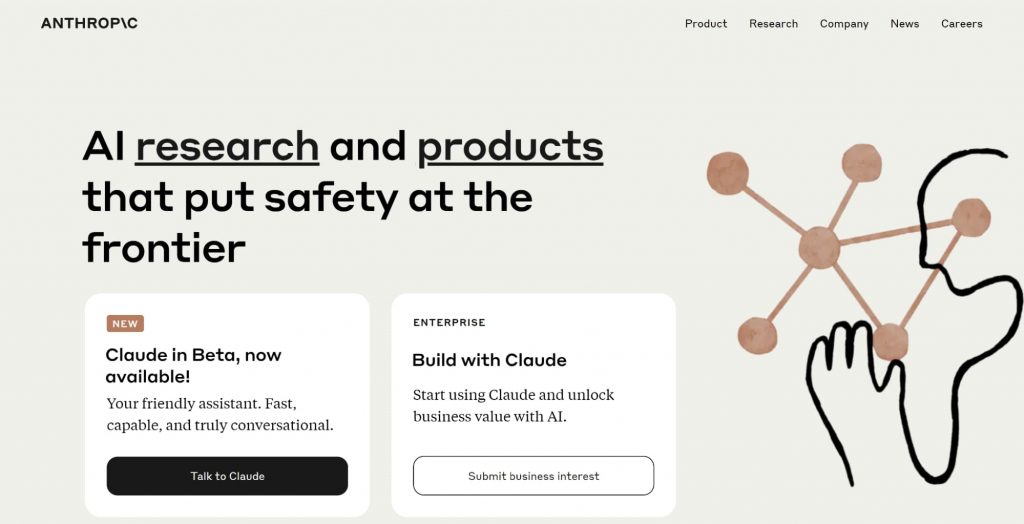
Anthropic is a San Francisco-based AI safety and research company, renowned for its interdisciplinary team with expertise in machine learning, physics, policy, and product development.
Anthropic’s product, Claude, is a next-generation AI assistant designed to cater to a variety of tasks, irrespective of their scale. Claude integrates “Constitutional AI,” ensuring reduced brand risk and top-notch data retention without training on your data. Its advanced capabilities include handling complex multi-step instructions across vast content with over 100,000 token windows and the ability to be personalized for specific use cases and voices.
Claude is adept at sophisticated dialogue, creative content generation, and detailed instruction following, excelling in complex reasoning, creativity, and coding. Additionally, there’s Claude Instant, a faster and more cost-effective model, capable of casual dialogue, text analysis, summarization, and document comprehension.
Observe.AI

Observe.AI is distinguished by its innovative approach to contact center conversation intelligence. Their platform is uniquely powered by a large language model (LLM) with 30 billion parameters, designed to extract valuable insights from every customer interaction. This platform offers a comprehensive view of customer conversations across all channels, enabling businesses to identify trends, opportunities, and risks more effectively.
Key features of Observe.AI include real-time guidance, targeted coaching, and automated workflows, all driven by Generative AI. These tools aim to elevate team performance to new heights.
Dataiku

Dataiku presents itself as a versatile platform for “Everyday AI”, allowing users to build, deploy, and manage data and AI projects seamlessly in one integrated space.
The platform is particularly notable for its capabilities in creating Generative AI applications suitable for enterprise-level use. It offers a range of development tools, pre-built use cases, and AI-powered assistants, enabling users to move beyond theoretical models to practical, real-world applications.
Dataiku supports data connection, cleansing, and preparation at scale, with both visual and coding interfaces. Its AutoML feature accelerates model building, providing a guided framework alongside the option for custom coding. Additionally, the platform allows for the expansion of its native capabilities through plugins and custom applications, further enhancing its impact.
Key to Dataiku’s offering is the ability to deploy, monitor, and maintain machine learning models on a single platform. This comprehensive approach enables teams to build, scale, and govern AI applications effectively, ensuring that the most valuable data projects and machine learning models are prioritized.
Landing AI
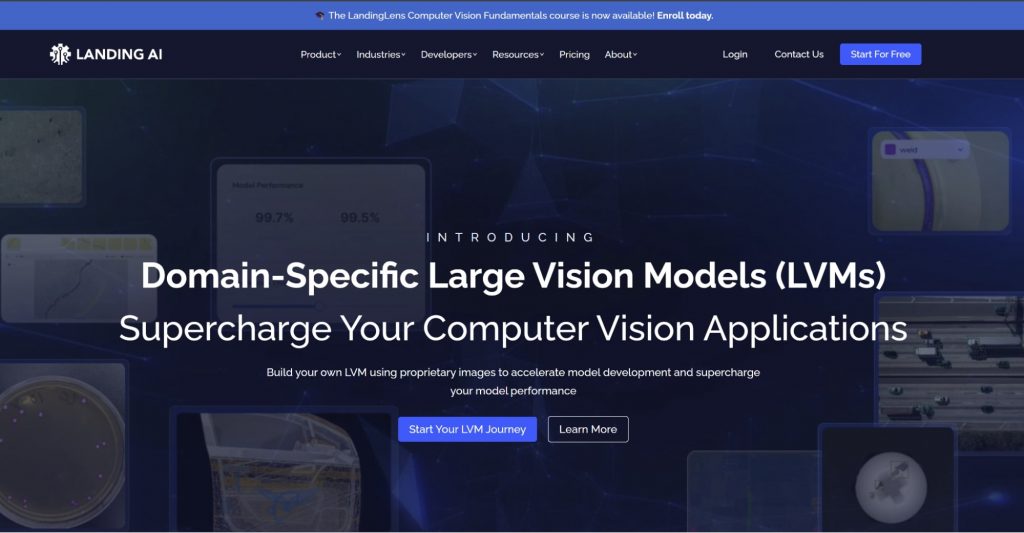
Landing AI specializes in Domain-Specific Large Vision Models (LVMs), designed to enhance computer vision applications. Their platform allows users to build their own LVM using proprietary images, significantly accelerating model development and improving performance.
These LVMs, trained on large datasets of images, are particularly adept at extracting intelligence from unlabeled images, which facilitates much faster development for a variety of downstream vision tasks.
The models are renowned for their enhanced accuracy in completing computer vision tasks, thanks to the improved intelligence of the LVMs. Additionally, Landing AI ensures seamless integration of these models with various deployment options, including Cloud, Edge, and Docker, offering flexibility and ease of integration.
A key advantage of their approach is the use of domain-specific LVMs as pre-built templates, which eliminates the need for building new models from scratch, thereby saving time and resources in the development process.
Frame AI

Frame AI offers an AI-powered customer intelligence platform that focuses on transforming how companies handle their support tickets and customer feedback.
Their natural language processing (NLP) technology utilizes over 27 different configurable factors, along with custom signals, to calculate the financial impact of each support ticket on the overall service cost. This approach enables businesses to optimize product experiences by understanding the real cost of service for each product area.
Additionally, Frame AI helps in identifying imbalances in customer support efforts, such as excessive time spent on minor customers or understaffing in new regions.
DeepMind

DeepMind, a division of Google, is devoted to the responsible development of artificial intelligence (AI) to benefit humanity. Their mission encompasses not only pioneering advancements in AI technology but also ensuring that these advancements are utilized thoughtfully and ethically.
DeepMind focuses on groundbreaking AI research and continuously updates the world with its latest findings and innovations. A significant part of their work involves improving Google’s vast array of products, impacting billions of users globally.
This commitment to ethical AI development and its application in real-world scenarios underscores DeepMind’s dedication to making AI a force for good in the world.
Stability AI
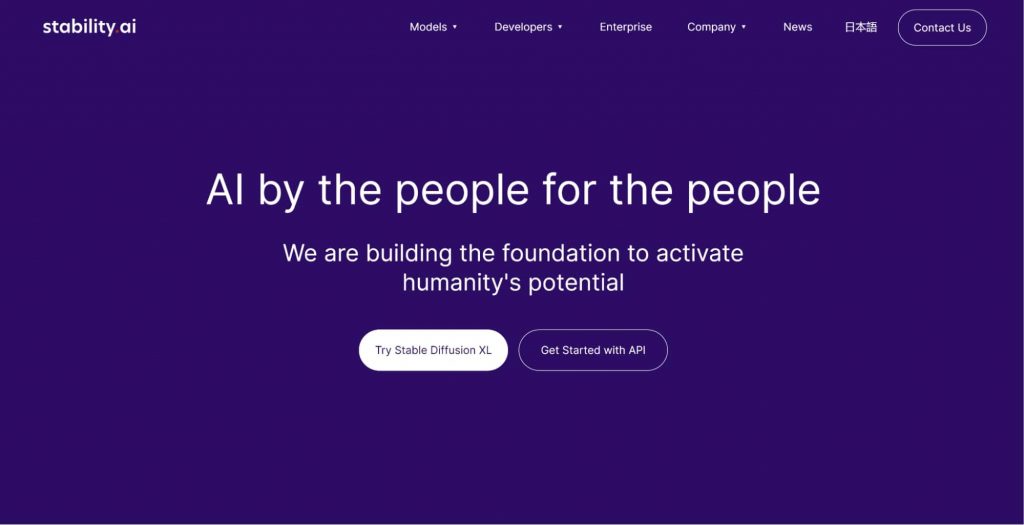
Stability AI positions itself as a pioneer in democratizing AI technology. Their approach involves creating accessible, open-source AI models in various domains.
One of their notable offerings is Stable Diffusion XL, a rapidly growing open software project that allows developers to build innovative applications using it as a foundational model.
They also have Stable Audio, which uses cutting-edge audio diffusion technology to generate high-quality music and sound effects.
Additionally, Stability AI has developed Stable LM, an open-access language model recognized for its innovation and industry-leading performance.
Builder.ai

Builder.ai stands out as a platform that simplifies app development, making it accessible to those without technical knowledge. Their approach combines the simplicity of no-code app builders with the technical sophistication of a development shop. This unique combination allows users to create custom apps that meet specific business needs.
Key offerings include Builder Studio for custom app development, Studio Store for ready-to-go online selling solutions, and Builder Cloud for cost-effective cloud hosting. They also offer Builder Now for quickly turning app ideas into working prototypes.
What sets Builder.ai apart is its use of AI to efficiently assemble apps based on chosen templates, ensuring cost-effective development with clear timelines and fixed costs. Additionally, their dedicated product managers, termed Productologists, collaborate closely with clients to ensure that the final app aligns perfectly with the initial vision.
Deep Tech Startups in Life Sciences
Moderna

Moderna, a trailblazer in mRNA technology, is committed to leveraging the potential of mRNA science to revolutionize medicine. mRNA, a natural component of the human body, serves as a messenger, instructing cells to perform specific functions.
Moderna harnesses this mechanism to develop medicines that stimulate the immune system to treat or prevent diseases, differing significantly from traditional medicine approaches.
Their belief in mRNA’s vast potential drives them to explore treatments for various diseases, including those lacking current treatments. Moderna’s platform allows rapid design, research, and testing of multiple mRNAs, enabling faster production and distribution of medicines.
Insitro

Insitro is one of the deep tech companies that’s redefining the landscape of drug discovery and development by integrating machine learning with biology. They focus on making better predictions to guide pharmaceutical research and development, aiming to reduce the high rate of expensive failures typically seen in the industry.
By utilizing machine learning to predict which paths are more likely to yield successful medicines, Insitro aims to streamline the drug development process and deliver more effective treatments to patients.
The company’s approach involves a true collaboration across disciplines, merging the expertise of biologists, engineers, and data scientists. This interdisciplinary team works to generate and leverage data to advance the development of future medicines.
Insitro’s vision is to become a pioneering data-driven, integrated drug discovery and development company, bringing new and powerful tools to the field and driving innovation in pharmaceutical R&D.
Recursion Pharmaceuticals

Recursion is a biotechnology company that combines the power of machine learning with biology to revolutionize drug discovery and development.
Central to their approach is the Recursion Operating System (OS), an integrated system for generating, analyzing, and deriving insights from massive biological and chemical datasets. This platform includes the Recursion Data Universe, housing diverse and expansive datasets, and the Recursion Map, a suite of proprietary discovery, design, and development tools.
These components enable Recursion to explore foundational biology unconstrained by human bias and rapidly accelerate drug development programs.
Deep Tech Startups in Aerospace
Relativity Space

Relativity Space is an innovative rocket company, pioneering the use of 3D printing in aerospace manufacturing. Their mission is to become a leading commercial launch provider, addressing the growing need for space infrastructure and launch services.
Their key innovation is the development of reusable rockets, notably the Terran R, the world’s first 3D-printed reusable rocket. This medium-to-heavy lift rocket is designed for efficiency, reusability, and cost-savings, capable of carrying significant payloads to various orbits, including missions to the Moon and Mars.
Relativity Space made headlines with the successful launch of Terran 1, the world’s largest 3D-printed object, into space in March 2023. This milestone demonstrated the viability of 3D-printed rockets and marked a new era in aerospace manufacturing.
Rocket Lab
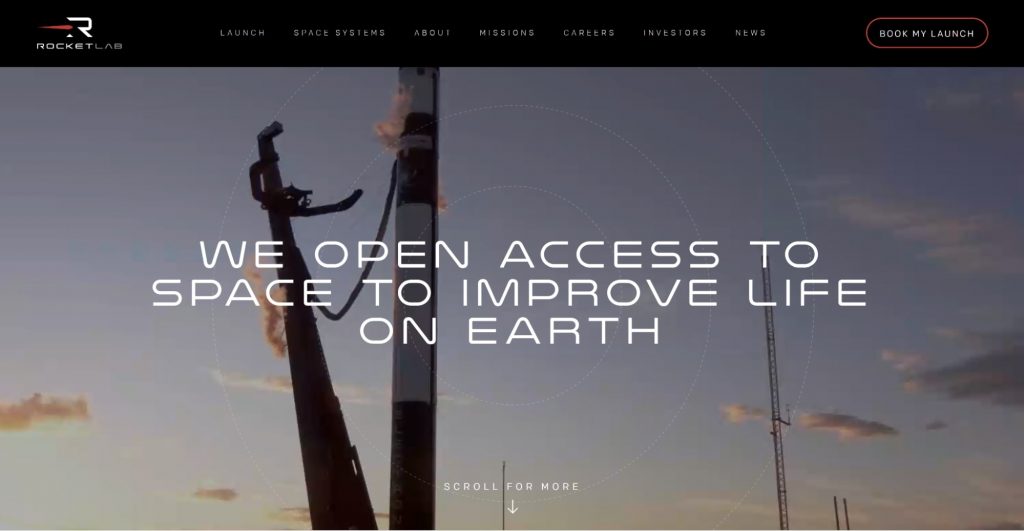
Rocket Lab is an end-to-end space company known for its reliable launch services, spacecraft design, manufacturing, satellite components, and flight software. It’s recognized for the Electron rocket, the second most frequently launched U.S. rocket, serving both commercial and government satellite operators with dedicated and rideshare options.
Rocket Lab also developed HASTE, a suborbital testbed launch vehicle, and is working on Neutron, a 13-tonne payload class launch vehicle for constellation deployment and interplanetary missions. Their configurable Photon spacecraft supports missions from low Earth orbit to planetary destinations.
Additionally, Rocket Lab provides industry-leading flight software, used across more than 50 spacecraft, and offers comprehensive command and control solutions for spacecraft and constellations.
SpaceX
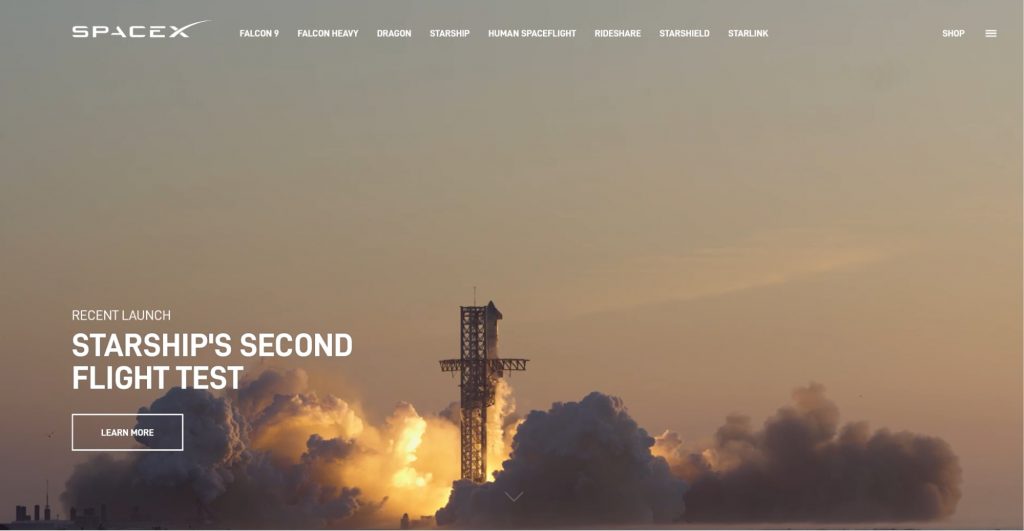
SpaceX, founded by Elon Musk in 2002, is a private aerospace manufacturer and space transport services company. It is known for its ambitious goal of reducing space transportation costs to enable the colonization of Mars.
SpaceX made history with the development of the Falcon 1, Falcon 9, Falcon Heavy rockets, and the Dragon spacecraft, which delivers cargo to the International Space Station (ISS). They achieved a significant milestone in aerospace with the first privately funded spacecraft (Dragon) to reach the ISS.
SpaceX also pioneered the reuse of orbital rockets, significantly impacting the economics of space travel. Their development of the Starship spacecraft aims to facilitate human exploration of Mars and beyond.
Deep Tech Startups in Robotics
Boston Dynamics

Boston Dynamics is at the forefront of robotics, offering practical solutions to address current and future automation challenges. Their robots, known for agility and mobility, are designed to operate in various environments, gathering data, ensuring safety, and exploring new frontiers.
One of their innovations, Stretch, is tailored for streamlining case handling and unloading operations in logistics. Boston Dynamics also focuses on enhancing workplace efficiency and safety with its robotic solutions.
The company is redefining the field of robotics, particularly with Atlas, their advanced humanoid robot, which showcases the limits of robot mobility, dexterity, and intelligence.
Vicarious

Vicarious is a leading AI-powered robotics solutions integrator, focused on automating complex and versatile tasks that surpass the capabilities of traditional automation. Their approach is built for flexible needs, enabling instant changeovers in high-mix operations without the need for fixturing.
Vicarious’ solutions have a significant bottom-line impact, offering a 50-90% reduction in labor hours and a 15-40% decrease in monthly costs, along with instant ROI from day one. They specialize in AI-backed robotics solutions for kitting, palletizing, packaging, and wall picking, streamlining operations across various industries.
Their technology includes high-speed palletization and custom packaging solutions, aiming to improve efficiency and reduce costs. Vicarious has over a decade of advanced research in AI and robotics, making it a leader in intelligent robotics and automation.
Agility Robotics

Agility Robotics is paving the way in robotic automation with Digit, the first mobile manipulation robot designed to integrate with existing automation technologies. Digit is uniquely capable of walking into and operating within current facilities, significantly enhancing the capabilities of companies.
Agility Robotics is also known for expanding its partnership with Amazon, indicating a commitment to advancing the application of robotics in diverse operational settings.
Challenges Faced by Deep Tech Startups
The world of deep tech startups is a dynamic yet challenging landscape, marked by the pursuit of groundbreaking technological advancements. However, these ventures face an inherently high risk of failure.
Statistically, less than 50% of tech startups succeed, with a striking 63% not making it past the initial hurdles. A quarter of these startups close down in their first year, and merely 10% manage to endure in the long run. So what are the challenges that deep tech startups encounter?
- Technical Complexity
Deep tech startups work on scientifically complex cutting-edge technologies, requiring specialized knowledge that is hard to find and retain.
- Long Development Cycles
The development and validation of new technologies often result in prolonged cycles and delayed market entry, posing financial challenges for resource-limited startups.
- High-risk Nature
The uncertainties in scientific research and development elevate the risk of failure, making it difficult for these startups to secure funding.
- Regulatory Hurdles
Operating in highly regulated industries like healthcare or biotechnology involves navigating complex regulations and obtaining necessary approvals, which is time-consuming and resource-intensive.
- Intellectual Property Protection
Protecting valuable IP through patents and legal mechanisms is challenging, expensive, and crucial for success.
- Marketing Approach
Deep tech startups spend a significant amount of time in stealth mode on R&D before marketing their products, requiring scientific validation of any claims made.
- Accurate Communication
Balancing the excitement around technology with the communication of accurate and verifiable information is challenging.
- Extensive Research
Initial stages involve extensive research with high risk and uncertainty, often unsure of the feasibility of the scientific basis of the startup.
- High Risk of Scientific Failure
Unlike typical tech startups focusing on product-market fit, deep tech startups have a higher risk of scientific failure due to research uncertainties.
- Pre-Launch Validation and Community Building
For deep tech startups, the path to securing funding often involves two crucial stages: validation of their technological solutions and building an engaged community. Initially, startups might self-fund to validate their solutions, demonstrating market fit and technology scalability.
Platforms like Prelaunch.com offer a specialized environment for startups to validate their products with real users, gather essential feedback, and build an engaged community. This early engagement is vital for demonstrating market fit, which is crucial for attracting investments. Utilizing Prelaunch.com can significantly aid deep tech startups in overcoming the common challenge of gaining traction and proving their concept in the highly competitive tech landscape.
Conclusion
Deep tech startups embody the spirit of innovation and the relentless pursuit of progress. As they continue to break new ground and challenge existing paradigms, their role in shaping our technological landscape and addressing critical global issues cannot be overstated.




